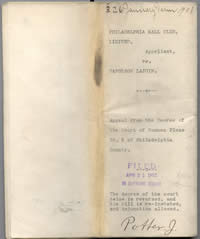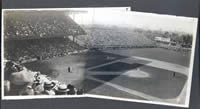The National Pastime - April 1902
Images
Click images for larger versions.
History
Record Group 33: Records of the Supreme Court, Eastern District, Opinions, 1900-1902. Supreme Court of Pennsylvania's decision to reverse the decree of the Common Pleas Court No. 5, 21 April 1902. Manuscript Group 219: Philadelphia Commercial Museum Photograph Collection, Shibe Park, Philadelphia, Home of the Philadelphia Athletics and Phillies, later known as Connie Mack Stadium, undated.
Several of the most important legal documents in the early history of modern major league baseball were created during a protracted legal battle that resulted from Napoleon Lajoie jumping his contract with the National League's Philadelphia Phillies in order to play for the upstart American League Philadelphia Athletics. This gave the Athletics instant credibility as a major league team, and helped to create great animosity between the two leagues. The Lajoie case is still cited as being relevant in sports law today.
After the 1900 baseball season, Ban Johnson and his newly formed American League declared open war on the National League. They renounced baseball's reserve clause that had bound players to the professional team with which they had initially signed until such time that the team no longer wished to continue to employ that particular player. As a result, bidding wars were fought between the two leagues over players' services. The National League lost over 100 of its players to the upstart American League for the 1901 season. Several future Hall of Fame inductees, including Wilbert Robinson, John McGraw and Napoleon Lajoie jumped leagues for the 1901 season. These players switched teams primarily for more money, as the upstart American League paid more for players' services than the National League. Lajoie was probably the biggest loss for the National League as he was just reaching his prime and was the most skilled hitter of the day. Nap won the Triple Crown in the American League in 1901, leading the junior circuit in batting average, home runs and runs batted in. His batting average of .426 is still the highest batting average ever achieved in an American league season.
In early 1901, the owner of the Philadelphia Phillies, Colonel John L. Rogers, filed suit in state court to try to regain Lajoie's services. Rogers and his team, the Philadelphia Ball Club, Limited, were the plaintiffs vs. Napoleon Lajoie, Benjamin F. Shibe, President, Cornelius Magillicuddy (Connie Mack), Manager and Treasurer of the Philadelphia American League Base Ball Club, and Frank Hough, Agent were the defendants. Common Pleas Court No. 5 rejected the Philadelphia Phillies request for an injunction against Lajoie and the American League on May 17, 1901. The Phillies promptly appealed this decision.
The Lajoie case was argued before the Supreme Court of Pennsylvania, on January 16, 1902. Two days before opening day of the 1902 baseball season the Court reversed the lower court's decision and declared that Lajoie should be prohibited from playing for any professional baseball club other than the Phillies. The Supreme Court concluded in its opinion that, "the services of the defendant are of such a unique character, and display such a special knowledge, skill and ability as renders them of peculiar value to the plaintiff. The action of the defendant in violating his contract is a breach of good faith, for which there would be no adequate redress at law, and the case therefore properly calls for the aid of equity, in negatively enforcing the performance of the contract, by enjoining against its breach. . . . Substantial justice between the parties requires that the court should restrain the defendant from playing for any other Club during the term of his contract with the plaintiff." This decision, filed on April 21, 1902, upheld the reserve clause and the Phillies' claim to Lajoie. It also established injunctions as a legal remedy to make players honor their contracts.
National League owners hailed the court's decision as a grand victory for themselves. The American League promised to fight the Supreme Court's decision. Manager Connie Mack played Lajoie in the Philadelphia Athletics' season opener in Baltimore against the Orioles on April 23, 1902. Mack received a telegram, during the game, informing him that the Supreme Court had issued an injunction barring Lajoie from playing for the Athletics. Mack then removed Lajoie from what would end up being his last game as an Athletic for thirteen years.
Napoleon Lajoie appealed the Supreme Court's decision on May 5, 1902. Nevertheless, Lajoie would not play another major league game for any team for about two months as lawyers and club owners debated what the court's ruling actually demanded. Eventually, it was decided that the injunction was only effective in Pennsylvania. Not wishing to lose its greatest star in Lajoie, the American League persuaded the Athletics management to transfer Lajoie to the Cleveland franchise. For the remainder of 1902 Lajoie was unable to play any road games in Philadelphia when the Cleveland ball club visited the City of Brotherly Love, due to the injunction. In fact, Lajoie did not even accompany the Cleveland team when it visited Philadelphia that year, due to a fear of contempt of court citations or civil lawsuits.
The American League outdrew the National League at the box office in the three cities in which they directly competed in 1902: Philadelphia, Boston and Chicago. The National League thereafter had to recognize that the American League had become too successful to destroy. Peace was made between the two leagues in early 1903 as the American League agreed to recognize the National Agreement which included the reserve clause. Players who had jumped leagues during the "war" of 1901-1902 were allowed to stay with their present teams. The Phillies allowed the injunction against Lajoie to be dismissed by not continuing their action on January 5, 1903. Napoleon Lajoie continued his stellar major league career through 1916 and was elected to the National Baseball Hall of Fame in 1937.

